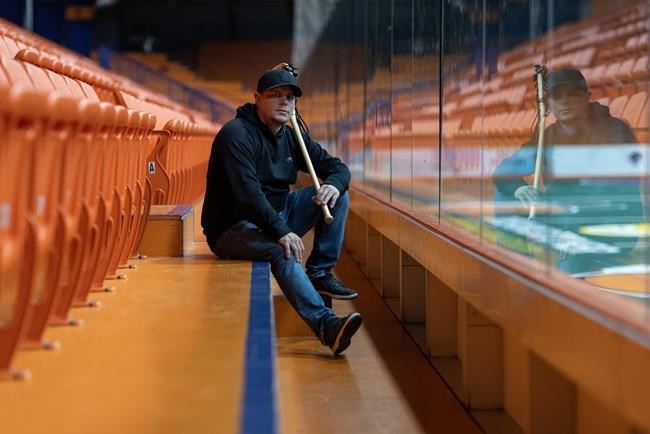Canada's sport minister is supporting the Haudenosaunee Nationals' bid to compete as a separate nation in lacrosse at the 2028 Los Angeles Olympics.
Carla Qualtrough issued a statement supporting the Indigenous lacrosse teams on Wednesday, hours after U.S. President Joe Biden announced a similar stance. If the Haudenosaunee are allowed to compete as a separate nation in 2028 it would be an unprecedented moment in Olympic history.
“Lacrosse is Canada’s national summer sport," said Qualtrough in a written statement to The Canadian Press. "It has been played by Indigenous peoples for hundreds of years. The Haudenosaunee Nationals are among the best in the world.
"When lacrosse returns to the Olympics in the 2028 Games, I hope to see the Haudenosaunee Nationals qualify and compete under their own flag."
Biden requested the International Olympic Committee allow the Haudenosaunee Nationals to compete as their own team at the Los Angeles Games at the White House Tribal Nations Summit earlier Wednesday. That would require the IOC to make an exception to a rule that permits teams playing only as part of an official national Olympic committee to compete in the Olympics.
"We're hopeful the IOC will see it our way, as well," Tom Perez, the White House senior adviser and director of intergovernmental affairs, told The Associated Press. "If we're successful, it won't simply be the flag of the Haudenosaunee Confederacy that marches in the Olympics, it will be the flag of Indigenous people across the world."
The Haudenosaunee are a collection of six nations whose territory covers parts of Ontario, Quebec, and upstate New York. They invented the sport of lacrosse before European colonizers arrived in North America and have competed as a separate nation in international lacrosse events since 1990.
The current world rankings have the Haudenosaunee men in third, behind the U.S. and Canada. Their women's team is ranked seventh in the world.
Qualtrough said that having the Haudenosaunee Nationals play their sport at the 2028 Games is in keeping with the Olympic spirit.
"This would elevate the already immense talent on display, and harness the very best of sport to advance reconciliation," reads her statement.
Haudenosaunee players could, theoretically, play for Canada or the United States depending on which country they reside in. However, most Haudenosaunee players maintain that they would only play for an Indigenous team.
Lacrosse was previously contested at the 1904 and 1908 Summer Olympics. Only three teams played lacrosse at the 1904 St. Louis Games, two from Canada and one from the United States. The second Canadian team, however, was called the "Mohawk Indians" and was entirely Kanien'keha:ka players.
David Shoemaker, CEO and secretary-general of the Canadian Olympic Committee, said Wednesday that his organization is "thrilled" to see lacrosse back on the Olympic program. The COC believes the inclusion of lacrosse is an opportunity to further embrace the Truth and Reconciliation Committee’s Calls to Action.
"The COC looks forward to speaking with the Haudenosaunee Nationals Lacrosse Organization to understand how we can support their objectives around participation and leveraging the positive impact of bringing the sport to a global audience at LA28," said Shoemaker. "We are committed to being a collaborative partner with all parties, including the Haudenosaunee, Lacrosse Canada, IOC, World Lacrosse, USOPC and LA28 in maximizing the opportunities presented by lacrosse being on the Olympic program once again."
The modern Haudenosaunee Nationals were formed in 1983, playing for the first time in the 1990 men's field world championship. Players are from both sides of the Canadian-American border, with the majority coming from Six Nations of the Grand River First Nation, about 40 kilometres southwest of Hamilton, or Onondaga Nation, outside Syracuse, N.Y.
The Haudenosaunee were unable to compete at the 2010 men's world field championship in Manchester, England, because they attempted to travel on Haudenosaunee passports. The travel document is a form of identification used by Haudenosaunee people as an expression of their sovereignty.
Israel accepted the team's passports for the 2018 world field lacrosse championship, with assurances from the Canadian government that they would be allowed back into Canada. Ireland also accepted Haudenosaunee passports for the 2022 under-21 world lacrosse championship.
The Haudenosaunee also almost missed out on competing in the World Games, a multi-sport event that is a stepping-stone toward the Olympics, in 2022 because they also require the participating teams to have Olympic organizing committees.
World Lacrosse and several national lacrosse organizations petitioned the World Games organizers to allow the Haudenosaunee to play, with Ireland's men's and women's teams voluntarily stepping aside to make space in the six-team tournaments.
— With files from The Associated Press
This report by The Canadian Press was first published Dec. 6, 2023.
John Chidley-Hill, The Canadian Press



